Analyzing Hilton's Crisis Management Strategies in Hospitality Sector
VerifiedAdded on 2023/06/12
|22
|5627
|480
Case Study
AI Summary
This research project investigates the importance of crisis management in the hospitality sector, focusing on a case study of Hilton. The study explores the concept of crisis management, Hilton's current practices after COVID-19, and the relationship between crisis management and organizational performance. It uses a qualitative research approach to analyze data and provides recommendations for Hilton to improve its crisis management strategies. The literature review covers the definition of crisis management, Hilton's specific practices like digitized crisis communication and customer feedback integration, and the impact of effective crisis management on a company's market image and employee retention. The research methodology employs qualitative data collection, and the analysis and findings are based on interpreting themes from the collected data, ultimately leading to suggestions for enhancing Hilton's crisis management approach and ensuring better organizational performance during disruptive events.
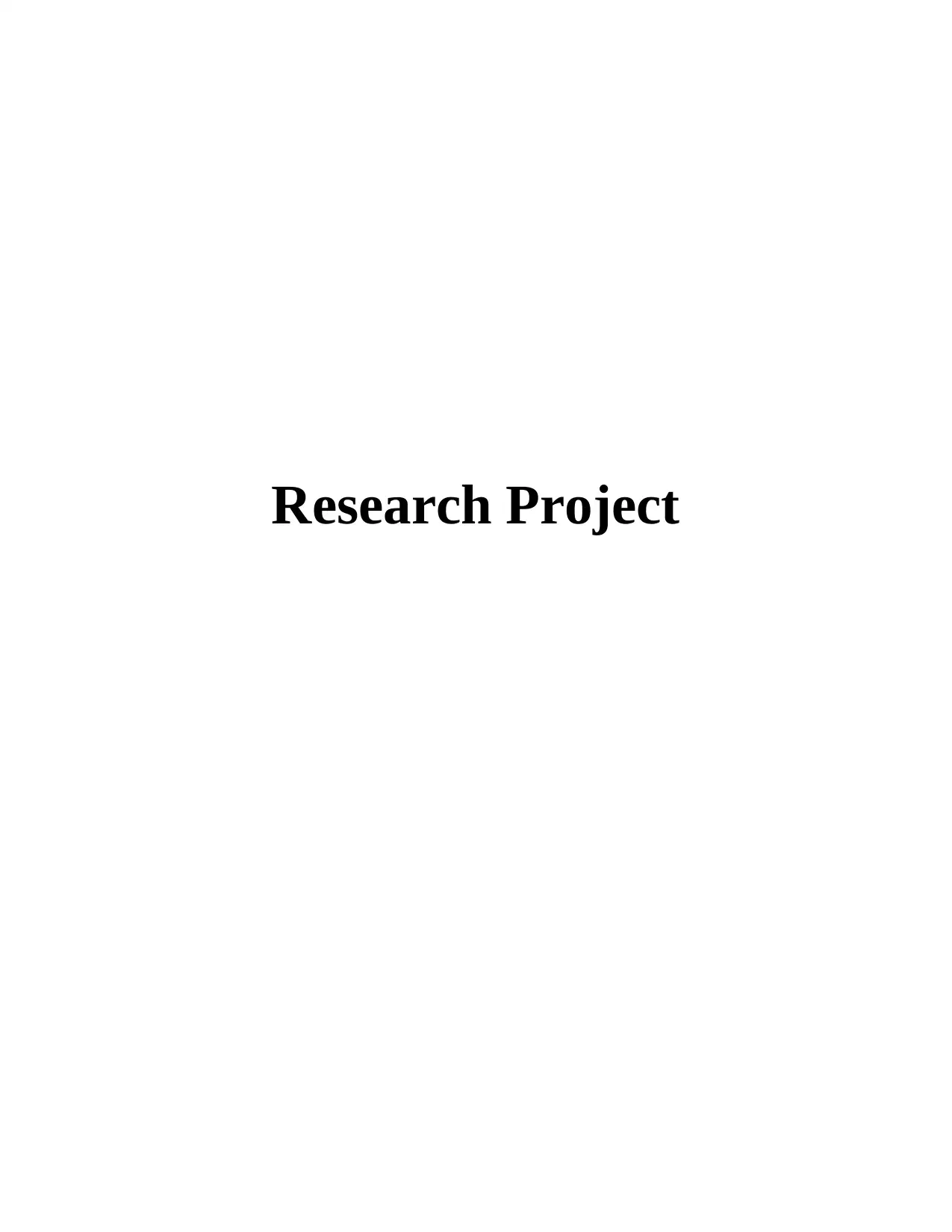
Research Project
Paraphrase This Document
Need a fresh take? Get an instant paraphrase of this document with our AI Paraphraser
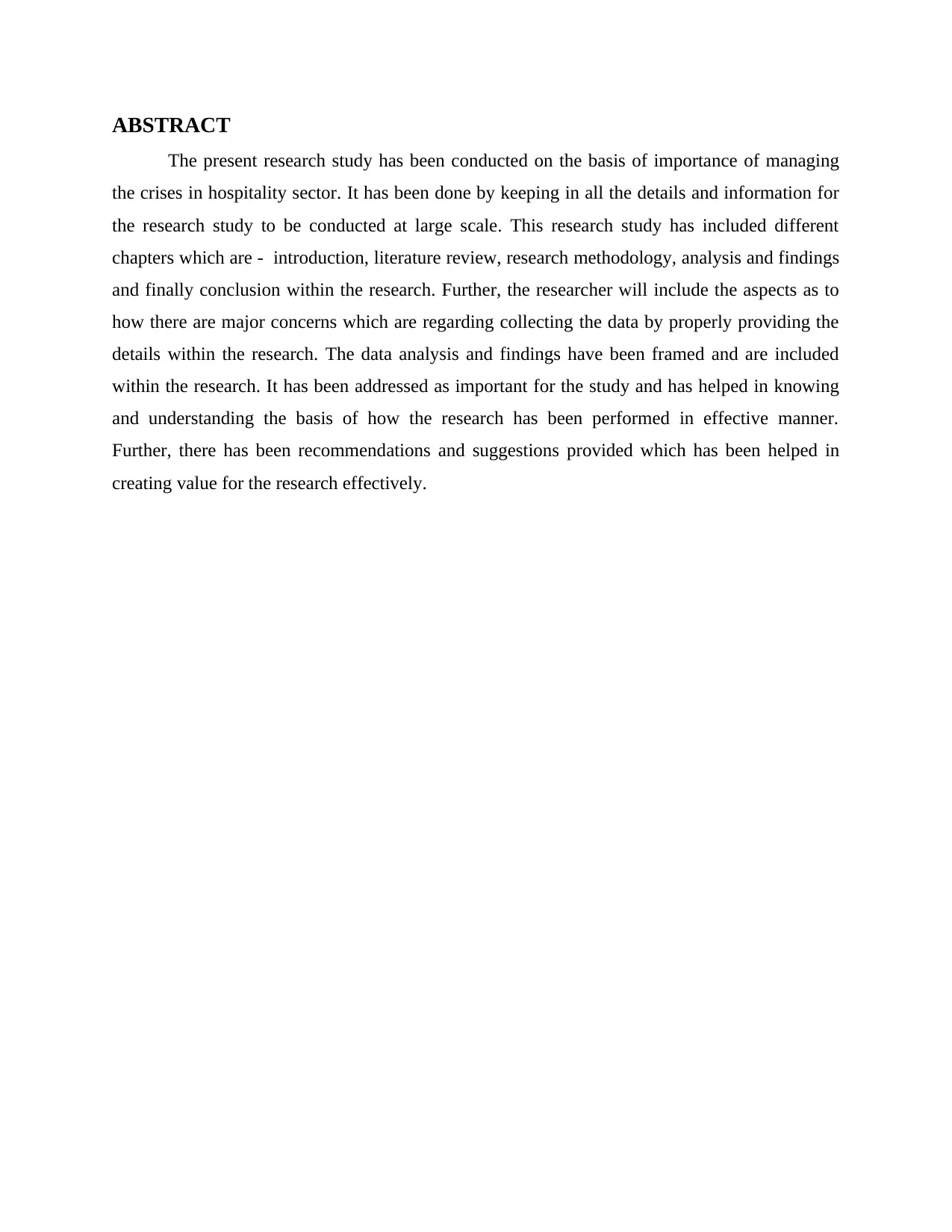
ABSTRACT
The present research study has been conducted on the basis of importance of managing
the crises in hospitality sector. It has been done by keeping in all the details and information for
the research study to be conducted at large scale. This research study has included different
chapters which are - introduction, literature review, research methodology, analysis and findings
and finally conclusion within the research. Further, the researcher will include the aspects as to
how there are major concerns which are regarding collecting the data by properly providing the
details within the research. The data analysis and findings have been framed and are included
within the research. It has been addressed as important for the study and has helped in knowing
and understanding the basis of how the research has been performed in effective manner.
Further, there has been recommendations and suggestions provided which has been helped in
creating value for the research effectively.
The present research study has been conducted on the basis of importance of managing
the crises in hospitality sector. It has been done by keeping in all the details and information for
the research study to be conducted at large scale. This research study has included different
chapters which are - introduction, literature review, research methodology, analysis and findings
and finally conclusion within the research. Further, the researcher will include the aspects as to
how there are major concerns which are regarding collecting the data by properly providing the
details within the research. The data analysis and findings have been framed and are included
within the research. It has been addressed as important for the study and has helped in knowing
and understanding the basis of how the research has been performed in effective manner.
Further, there has been recommendations and suggestions provided which has been helped in
creating value for the research effectively.
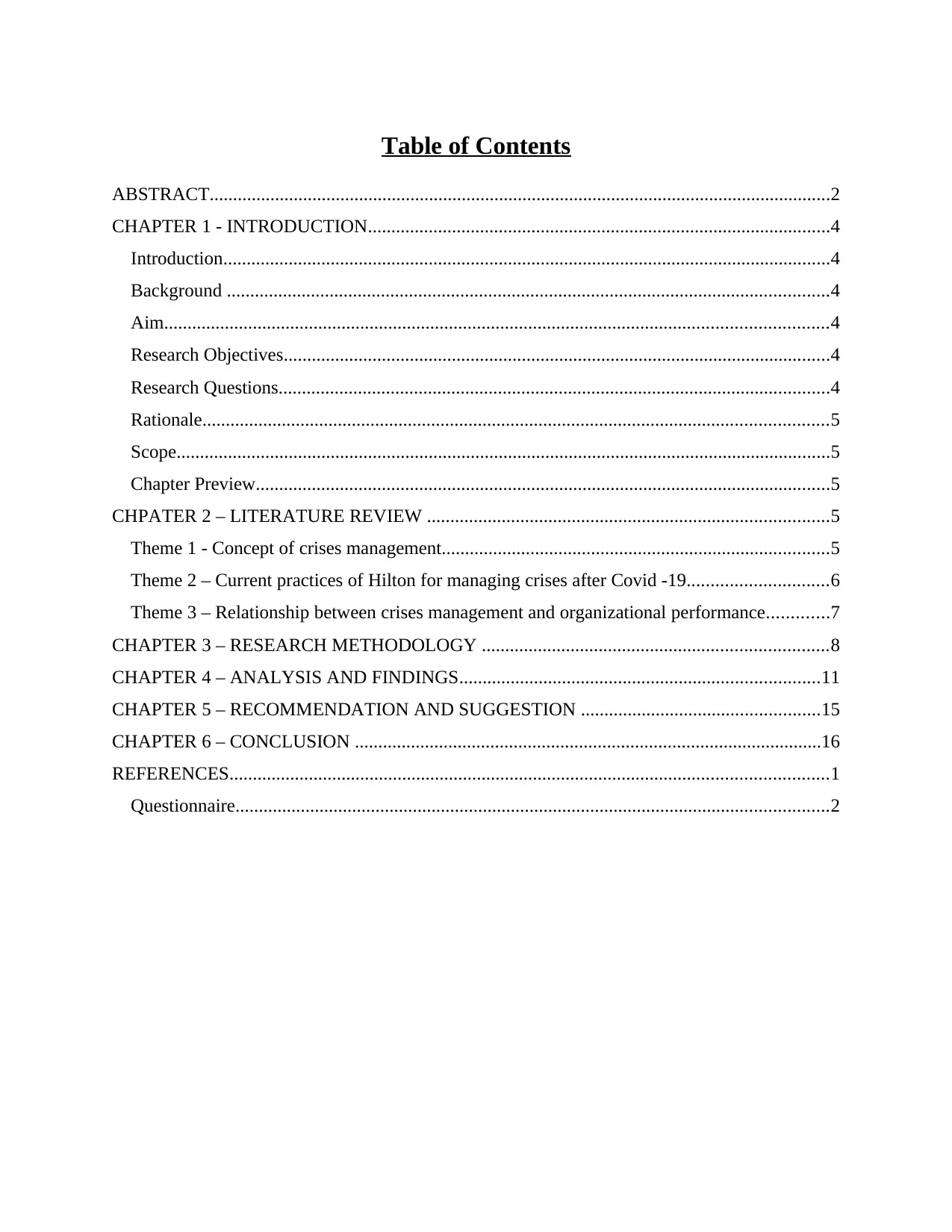
Table of Contents
ABSTRACT.....................................................................................................................................2
CHAPTER 1 - INTRODUCTION...................................................................................................4
Introduction..................................................................................................................................4
Background .................................................................................................................................4
Aim..............................................................................................................................................4
Research Objectives.....................................................................................................................4
Research Questions......................................................................................................................4
Rationale......................................................................................................................................5
Scope............................................................................................................................................5
Chapter Preview...........................................................................................................................5
CHPATER 2 – LITERATURE REVIEW ......................................................................................5
Theme 1 - Concept of crises management...................................................................................5
Theme 2 – Current practices of Hilton for managing crises after Covid -19..............................6
Theme 3 – Relationship between crises management and organizational performance.............7
CHAPTER 3 – RESEARCH METHODOLOGY ..........................................................................8
CHAPTER 4 – ANALYSIS AND FINDINGS.............................................................................11
CHAPTER 5 – RECOMMENDATION AND SUGGESTION ...................................................15
CHAPTER 6 – CONCLUSION ....................................................................................................16
REFERENCES................................................................................................................................1
Questionnaire...............................................................................................................................2
ABSTRACT.....................................................................................................................................2
CHAPTER 1 - INTRODUCTION...................................................................................................4
Introduction..................................................................................................................................4
Background .................................................................................................................................4
Aim..............................................................................................................................................4
Research Objectives.....................................................................................................................4
Research Questions......................................................................................................................4
Rationale......................................................................................................................................5
Scope............................................................................................................................................5
Chapter Preview...........................................................................................................................5
CHPATER 2 – LITERATURE REVIEW ......................................................................................5
Theme 1 - Concept of crises management...................................................................................5
Theme 2 – Current practices of Hilton for managing crises after Covid -19..............................6
Theme 3 – Relationship between crises management and organizational performance.............7
CHAPTER 3 – RESEARCH METHODOLOGY ..........................................................................8
CHAPTER 4 – ANALYSIS AND FINDINGS.............................................................................11
CHAPTER 5 – RECOMMENDATION AND SUGGESTION ...................................................15
CHAPTER 6 – CONCLUSION ....................................................................................................16
REFERENCES................................................................................................................................1
Questionnaire...............................................................................................................................2
⊘ This is a preview!⊘
Do you want full access?
Subscribe today to unlock all pages.

Trusted by 1+ million students worldwide
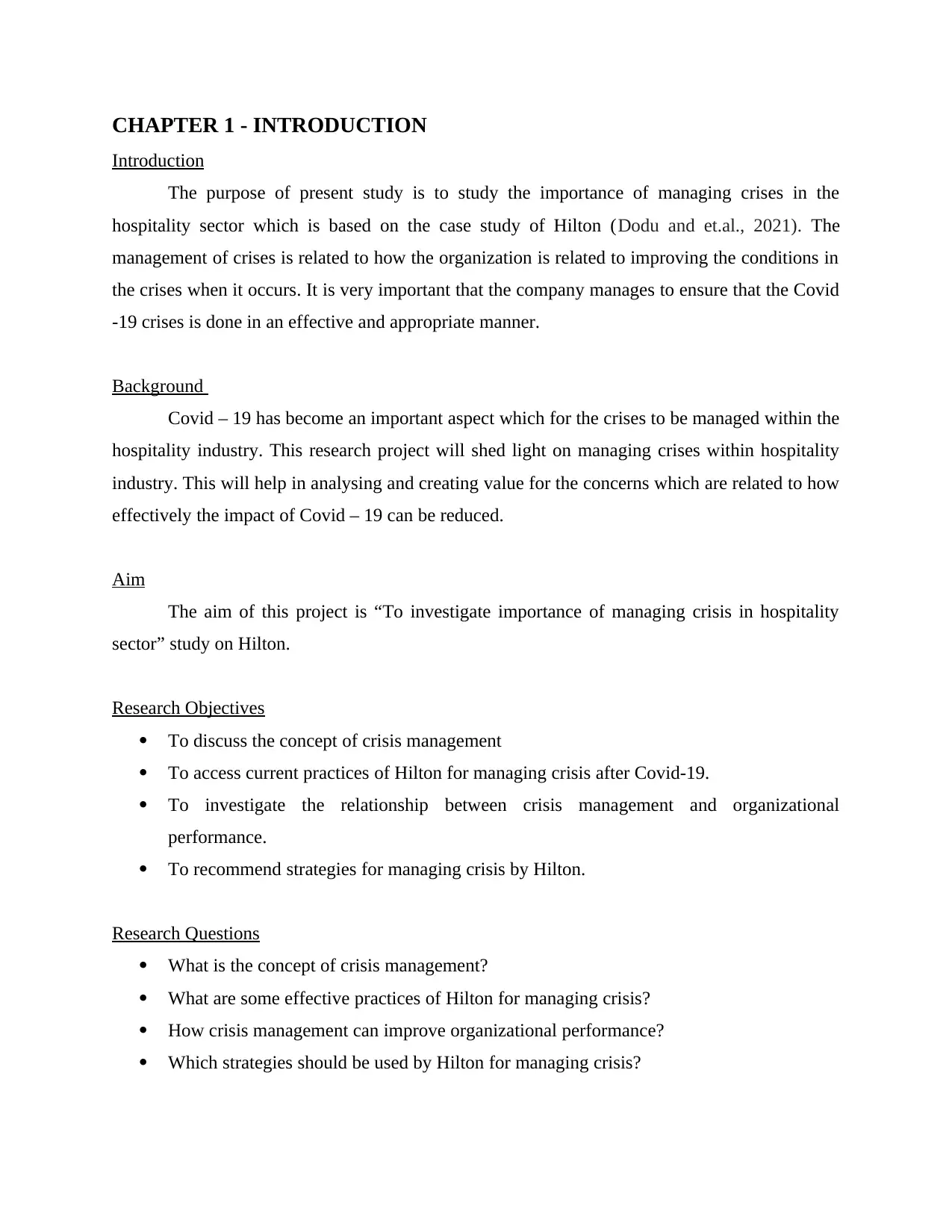
CHAPTER 1 - INTRODUCTION
Introduction
The purpose of present study is to study the importance of managing crises in the
hospitality sector which is based on the case study of Hilton (Dodu and et.al., 2021). The
management of crises is related to how the organization is related to improving the conditions in
the crises when it occurs. It is very important that the company manages to ensure that the Covid
-19 crises is done in an effective and appropriate manner.
Background
Covid – 19 has become an important aspect which for the crises to be managed within the
hospitality industry. This research project will shed light on managing crises within hospitality
industry. This will help in analysing and creating value for the concerns which are related to how
effectively the impact of Covid – 19 can be reduced.
Aim
The aim of this project is “To investigate importance of managing crisis in hospitality
sector” study on Hilton.
Research Objectives
To discuss the concept of crisis management
To access current practices of Hilton for managing crisis after Covid-19.
To investigate the relationship between crisis management and organizational
performance.
To recommend strategies for managing crisis by Hilton.
Research Questions
What is the concept of crisis management?
What are some effective practices of Hilton for managing crisis?
How crisis management can improve organizational performance?
Which strategies should be used by Hilton for managing crisis?
Introduction
The purpose of present study is to study the importance of managing crises in the
hospitality sector which is based on the case study of Hilton (Dodu and et.al., 2021). The
management of crises is related to how the organization is related to improving the conditions in
the crises when it occurs. It is very important that the company manages to ensure that the Covid
-19 crises is done in an effective and appropriate manner.
Background
Covid – 19 has become an important aspect which for the crises to be managed within the
hospitality industry. This research project will shed light on managing crises within hospitality
industry. This will help in analysing and creating value for the concerns which are related to how
effectively the impact of Covid – 19 can be reduced.
Aim
The aim of this project is “To investigate importance of managing crisis in hospitality
sector” study on Hilton.
Research Objectives
To discuss the concept of crisis management
To access current practices of Hilton for managing crisis after Covid-19.
To investigate the relationship between crisis management and organizational
performance.
To recommend strategies for managing crisis by Hilton.
Research Questions
What is the concept of crisis management?
What are some effective practices of Hilton for managing crisis?
How crisis management can improve organizational performance?
Which strategies should be used by Hilton for managing crisis?
Paraphrase This Document
Need a fresh take? Get an instant paraphrase of this document with our AI Paraphraser
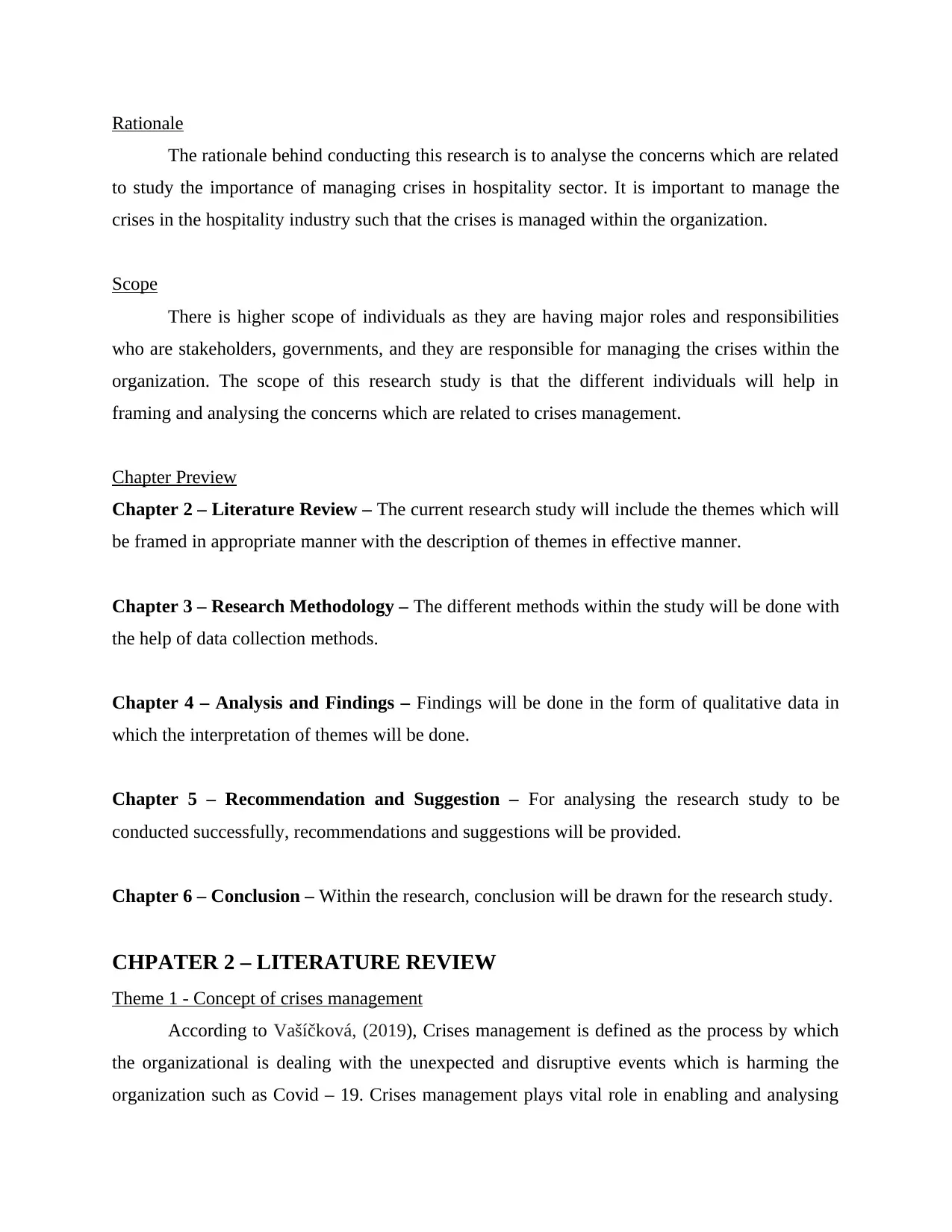
Rationale
The rationale behind conducting this research is to analyse the concerns which are related
to study the importance of managing crises in hospitality sector. It is important to manage the
crises in the hospitality industry such that the crises is managed within the organization.
Scope
There is higher scope of individuals as they are having major roles and responsibilities
who are stakeholders, governments, and they are responsible for managing the crises within the
organization. The scope of this research study is that the different individuals will help in
framing and analysing the concerns which are related to crises management.
Chapter Preview
Chapter 2 – Literature Review – The current research study will include the themes which will
be framed in appropriate manner with the description of themes in effective manner.
Chapter 3 – Research Methodology – The different methods within the study will be done with
the help of data collection methods.
Chapter 4 – Analysis and Findings – Findings will be done in the form of qualitative data in
which the interpretation of themes will be done.
Chapter 5 – Recommendation and Suggestion – For analysing the research study to be
conducted successfully, recommendations and suggestions will be provided.
Chapter 6 – Conclusion – Within the research, conclusion will be drawn for the research study.
CHPATER 2 – LITERATURE REVIEW
Theme 1 - Concept of crises management
According to Vašíčková, (2019), Crises management is defined as the process by which
the organizational is dealing with the unexpected and disruptive events which is harming the
organization such as Covid – 19. Crises management plays vital role in enabling and analysing
The rationale behind conducting this research is to analyse the concerns which are related
to study the importance of managing crises in hospitality sector. It is important to manage the
crises in the hospitality industry such that the crises is managed within the organization.
Scope
There is higher scope of individuals as they are having major roles and responsibilities
who are stakeholders, governments, and they are responsible for managing the crises within the
organization. The scope of this research study is that the different individuals will help in
framing and analysing the concerns which are related to crises management.
Chapter Preview
Chapter 2 – Literature Review – The current research study will include the themes which will
be framed in appropriate manner with the description of themes in effective manner.
Chapter 3 – Research Methodology – The different methods within the study will be done with
the help of data collection methods.
Chapter 4 – Analysis and Findings – Findings will be done in the form of qualitative data in
which the interpretation of themes will be done.
Chapter 5 – Recommendation and Suggestion – For analysing the research study to be
conducted successfully, recommendations and suggestions will be provided.
Chapter 6 – Conclusion – Within the research, conclusion will be drawn for the research study.
CHPATER 2 – LITERATURE REVIEW
Theme 1 - Concept of crises management
According to Vašíčková, (2019), Crises management is defined as the process by which
the organizational is dealing with the unexpected and disruptive events which is harming the
organization such as Covid – 19. Crises management plays vital role in enabling and analysing
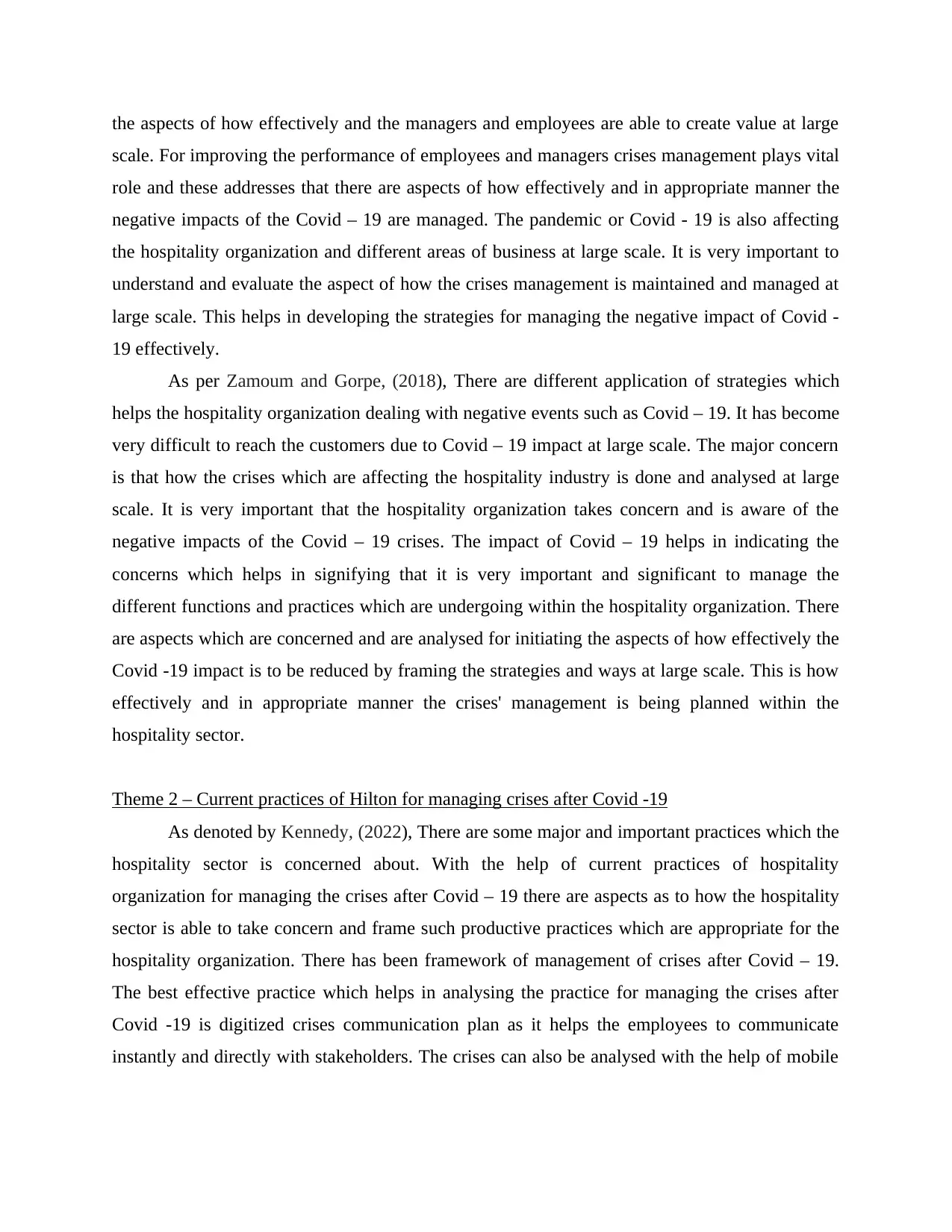
the aspects of how effectively and the managers and employees are able to create value at large
scale. For improving the performance of employees and managers crises management plays vital
role and these addresses that there are aspects of how effectively and in appropriate manner the
negative impacts of the Covid – 19 are managed. The pandemic or Covid - 19 is also affecting
the hospitality organization and different areas of business at large scale. It is very important to
understand and evaluate the aspect of how the crises management is maintained and managed at
large scale. This helps in developing the strategies for managing the negative impact of Covid -
19 effectively.
As per Zamoum and Gorpe, (2018), There are different application of strategies which
helps the hospitality organization dealing with negative events such as Covid – 19. It has become
very difficult to reach the customers due to Covid – 19 impact at large scale. The major concern
is that how the crises which are affecting the hospitality industry is done and analysed at large
scale. It is very important that the hospitality organization takes concern and is aware of the
negative impacts of the Covid – 19 crises. The impact of Covid – 19 helps in indicating the
concerns which helps in signifying that it is very important and significant to manage the
different functions and practices which are undergoing within the hospitality organization. There
are aspects which are concerned and are analysed for initiating the aspects of how effectively the
Covid -19 impact is to be reduced by framing the strategies and ways at large scale. This is how
effectively and in appropriate manner the crises' management is being planned within the
hospitality sector.
Theme 2 – Current practices of Hilton for managing crises after Covid -19
As denoted by Kennedy, (2022), There are some major and important practices which the
hospitality sector is concerned about. With the help of current practices of hospitality
organization for managing the crises after Covid – 19 there are aspects as to how the hospitality
sector is able to take concern and frame such productive practices which are appropriate for the
hospitality organization. There has been framework of management of crises after Covid – 19.
The best effective practice which helps in analysing the practice for managing the crises after
Covid -19 is digitized crises communication plan as it helps the employees to communicate
instantly and directly with stakeholders. The crises can also be analysed with the help of mobile
scale. For improving the performance of employees and managers crises management plays vital
role and these addresses that there are aspects of how effectively and in appropriate manner the
negative impacts of the Covid – 19 are managed. The pandemic or Covid - 19 is also affecting
the hospitality organization and different areas of business at large scale. It is very important to
understand and evaluate the aspect of how the crises management is maintained and managed at
large scale. This helps in developing the strategies for managing the negative impact of Covid -
19 effectively.
As per Zamoum and Gorpe, (2018), There are different application of strategies which
helps the hospitality organization dealing with negative events such as Covid – 19. It has become
very difficult to reach the customers due to Covid – 19 impact at large scale. The major concern
is that how the crises which are affecting the hospitality industry is done and analysed at large
scale. It is very important that the hospitality organization takes concern and is aware of the
negative impacts of the Covid – 19 crises. The impact of Covid – 19 helps in indicating the
concerns which helps in signifying that it is very important and significant to manage the
different functions and practices which are undergoing within the hospitality organization. There
are aspects which are concerned and are analysed for initiating the aspects of how effectively the
Covid -19 impact is to be reduced by framing the strategies and ways at large scale. This is how
effectively and in appropriate manner the crises' management is being planned within the
hospitality sector.
Theme 2 – Current practices of Hilton for managing crises after Covid -19
As denoted by Kennedy, (2022), There are some major and important practices which the
hospitality sector is concerned about. With the help of current practices of hospitality
organization for managing the crises after Covid – 19 there are aspects as to how the hospitality
sector is able to take concern and frame such productive practices which are appropriate for the
hospitality organization. There has been framework of management of crises after Covid – 19.
The best effective practice which helps in analysing the practice for managing the crises after
Covid -19 is digitized crises communication plan as it helps the employees to communicate
instantly and directly with stakeholders. The crises can also be analysed with the help of mobile
⊘ This is a preview!⊘
Do you want full access?
Subscribe today to unlock all pages.

Trusted by 1+ million students worldwide
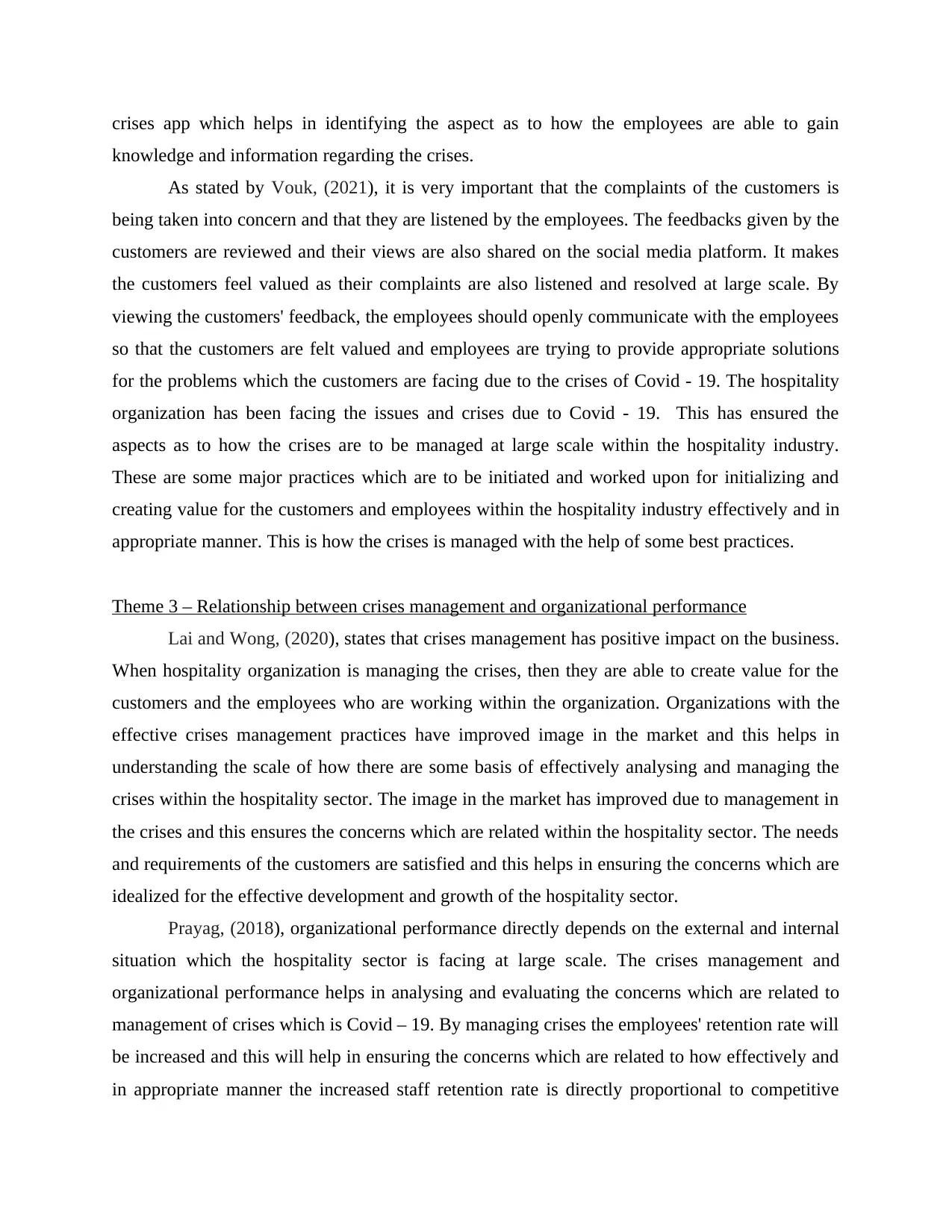
crises app which helps in identifying the aspect as to how the employees are able to gain
knowledge and information regarding the crises.
As stated by Vouk, (2021), it is very important that the complaints of the customers is
being taken into concern and that they are listened by the employees. The feedbacks given by the
customers are reviewed and their views are also shared on the social media platform. It makes
the customers feel valued as their complaints are also listened and resolved at large scale. By
viewing the customers' feedback, the employees should openly communicate with the employees
so that the customers are felt valued and employees are trying to provide appropriate solutions
for the problems which the customers are facing due to the crises of Covid - 19. The hospitality
organization has been facing the issues and crises due to Covid - 19. This has ensured the
aspects as to how the crises are to be managed at large scale within the hospitality industry.
These are some major practices which are to be initiated and worked upon for initializing and
creating value for the customers and employees within the hospitality industry effectively and in
appropriate manner. This is how the crises is managed with the help of some best practices.
Theme 3 – Relationship between crises management and organizational performance
Lai and Wong, (2020), states that crises management has positive impact on the business.
When hospitality organization is managing the crises, then they are able to create value for the
customers and the employees who are working within the organization. Organizations with the
effective crises management practices have improved image in the market and this helps in
understanding the scale of how there are some basis of effectively analysing and managing the
crises within the hospitality sector. The image in the market has improved due to management in
the crises and this ensures the concerns which are related within the hospitality sector. The needs
and requirements of the customers are satisfied and this helps in ensuring the concerns which are
idealized for the effective development and growth of the hospitality sector.
Prayag, (2018), organizational performance directly depends on the external and internal
situation which the hospitality sector is facing at large scale. The crises management and
organizational performance helps in analysing and evaluating the concerns which are related to
management of crises which is Covid – 19. By managing crises the employees' retention rate will
be increased and this will help in ensuring the concerns which are related to how effectively and
in appropriate manner the increased staff retention rate is directly proportional to competitive
knowledge and information regarding the crises.
As stated by Vouk, (2021), it is very important that the complaints of the customers is
being taken into concern and that they are listened by the employees. The feedbacks given by the
customers are reviewed and their views are also shared on the social media platform. It makes
the customers feel valued as their complaints are also listened and resolved at large scale. By
viewing the customers' feedback, the employees should openly communicate with the employees
so that the customers are felt valued and employees are trying to provide appropriate solutions
for the problems which the customers are facing due to the crises of Covid - 19. The hospitality
organization has been facing the issues and crises due to Covid - 19. This has ensured the
aspects as to how the crises are to be managed at large scale within the hospitality industry.
These are some major practices which are to be initiated and worked upon for initializing and
creating value for the customers and employees within the hospitality industry effectively and in
appropriate manner. This is how the crises is managed with the help of some best practices.
Theme 3 – Relationship between crises management and organizational performance
Lai and Wong, (2020), states that crises management has positive impact on the business.
When hospitality organization is managing the crises, then they are able to create value for the
customers and the employees who are working within the organization. Organizations with the
effective crises management practices have improved image in the market and this helps in
understanding the scale of how there are some basis of effectively analysing and managing the
crises within the hospitality sector. The image in the market has improved due to management in
the crises and this ensures the concerns which are related within the hospitality sector. The needs
and requirements of the customers are satisfied and this helps in ensuring the concerns which are
idealized for the effective development and growth of the hospitality sector.
Prayag, (2018), organizational performance directly depends on the external and internal
situation which the hospitality sector is facing at large scale. The crises management and
organizational performance helps in analysing and evaluating the concerns which are related to
management of crises which is Covid – 19. By managing crises the employees' retention rate will
be increased and this will help in ensuring the concerns which are related to how effectively and
in appropriate manner the increased staff retention rate is directly proportional to competitive
Paraphrase This Document
Need a fresh take? Get an instant paraphrase of this document with our AI Paraphraser
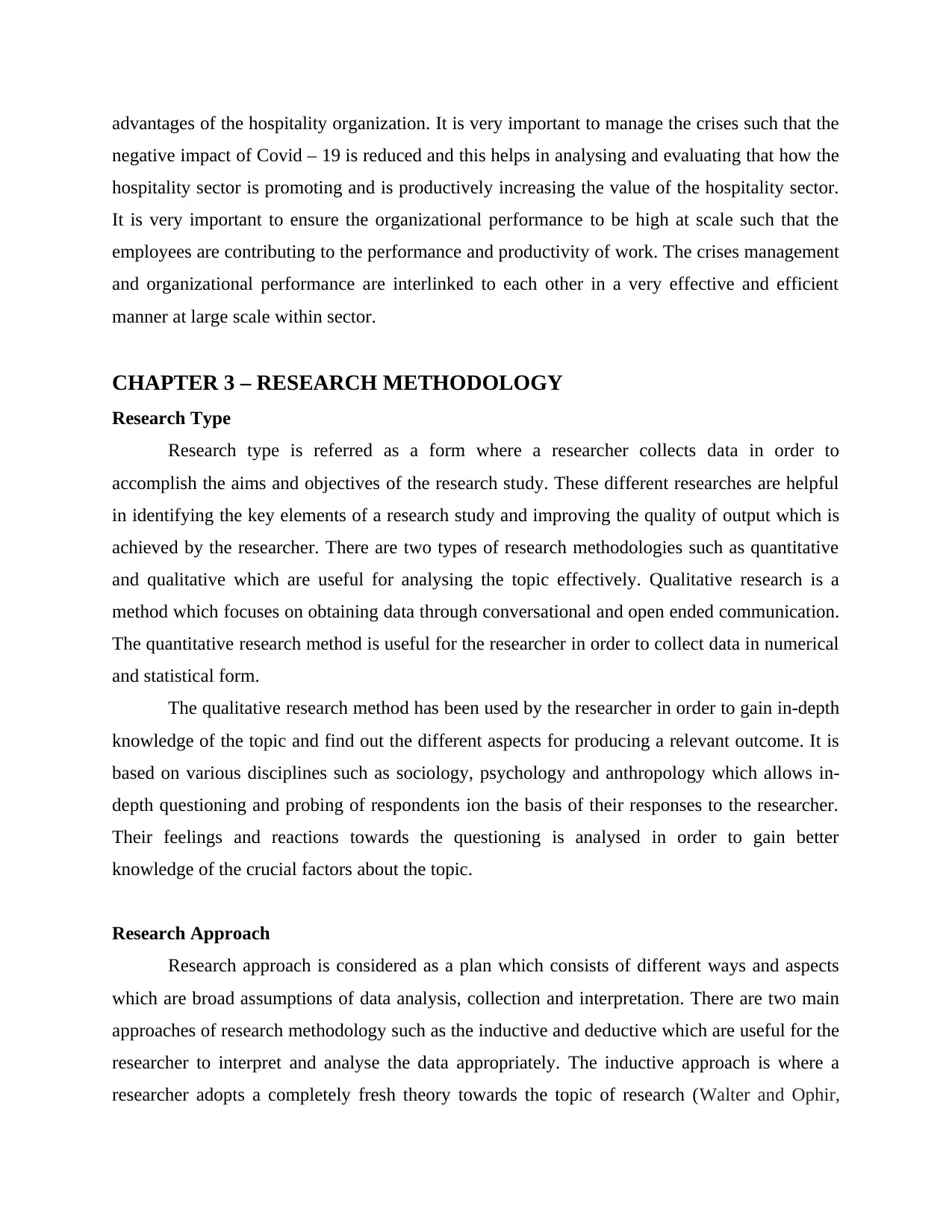
advantages of the hospitality organization. It is very important to manage the crises such that the
negative impact of Covid – 19 is reduced and this helps in analysing and evaluating that how the
hospitality sector is promoting and is productively increasing the value of the hospitality sector.
It is very important to ensure the organizational performance to be high at scale such that the
employees are contributing to the performance and productivity of work. The crises management
and organizational performance are interlinked to each other in a very effective and efficient
manner at large scale within sector.
CHAPTER 3 – RESEARCH METHODOLOGY
Research Type
Research type is referred as a form where a researcher collects data in order to
accomplish the aims and objectives of the research study. These different researches are helpful
in identifying the key elements of a research study and improving the quality of output which is
achieved by the researcher. There are two types of research methodologies such as quantitative
and qualitative which are useful for analysing the topic effectively. Qualitative research is a
method which focuses on obtaining data through conversational and open ended communication.
The quantitative research method is useful for the researcher in order to collect data in numerical
and statistical form.
The qualitative research method has been used by the researcher in order to gain in-depth
knowledge of the topic and find out the different aspects for producing a relevant outcome. It is
based on various disciplines such as sociology, psychology and anthropology which allows in-
depth questioning and probing of respondents ion the basis of their responses to the researcher.
Their feelings and reactions towards the questioning is analysed in order to gain better
knowledge of the crucial factors about the topic.
Research Approach
Research approach is considered as a plan which consists of different ways and aspects
which are broad assumptions of data analysis, collection and interpretation. There are two main
approaches of research methodology such as the inductive and deductive which are useful for the
researcher to interpret and analyse the data appropriately. The inductive approach is where a
researcher adopts a completely fresh theory towards the topic of research (Walter and Ophir,
negative impact of Covid – 19 is reduced and this helps in analysing and evaluating that how the
hospitality sector is promoting and is productively increasing the value of the hospitality sector.
It is very important to ensure the organizational performance to be high at scale such that the
employees are contributing to the performance and productivity of work. The crises management
and organizational performance are interlinked to each other in a very effective and efficient
manner at large scale within sector.
CHAPTER 3 – RESEARCH METHODOLOGY
Research Type
Research type is referred as a form where a researcher collects data in order to
accomplish the aims and objectives of the research study. These different researches are helpful
in identifying the key elements of a research study and improving the quality of output which is
achieved by the researcher. There are two types of research methodologies such as quantitative
and qualitative which are useful for analysing the topic effectively. Qualitative research is a
method which focuses on obtaining data through conversational and open ended communication.
The quantitative research method is useful for the researcher in order to collect data in numerical
and statistical form.
The qualitative research method has been used by the researcher in order to gain in-depth
knowledge of the topic and find out the different aspects for producing a relevant outcome. It is
based on various disciplines such as sociology, psychology and anthropology which allows in-
depth questioning and probing of respondents ion the basis of their responses to the researcher.
Their feelings and reactions towards the questioning is analysed in order to gain better
knowledge of the crucial factors about the topic.
Research Approach
Research approach is considered as a plan which consists of different ways and aspects
which are broad assumptions of data analysis, collection and interpretation. There are two main
approaches of research methodology such as the inductive and deductive which are useful for the
researcher to interpret and analyse the data appropriately. The inductive approach is where a
researcher adopts a completely fresh theory towards the topic of research (Walter and Ophir,
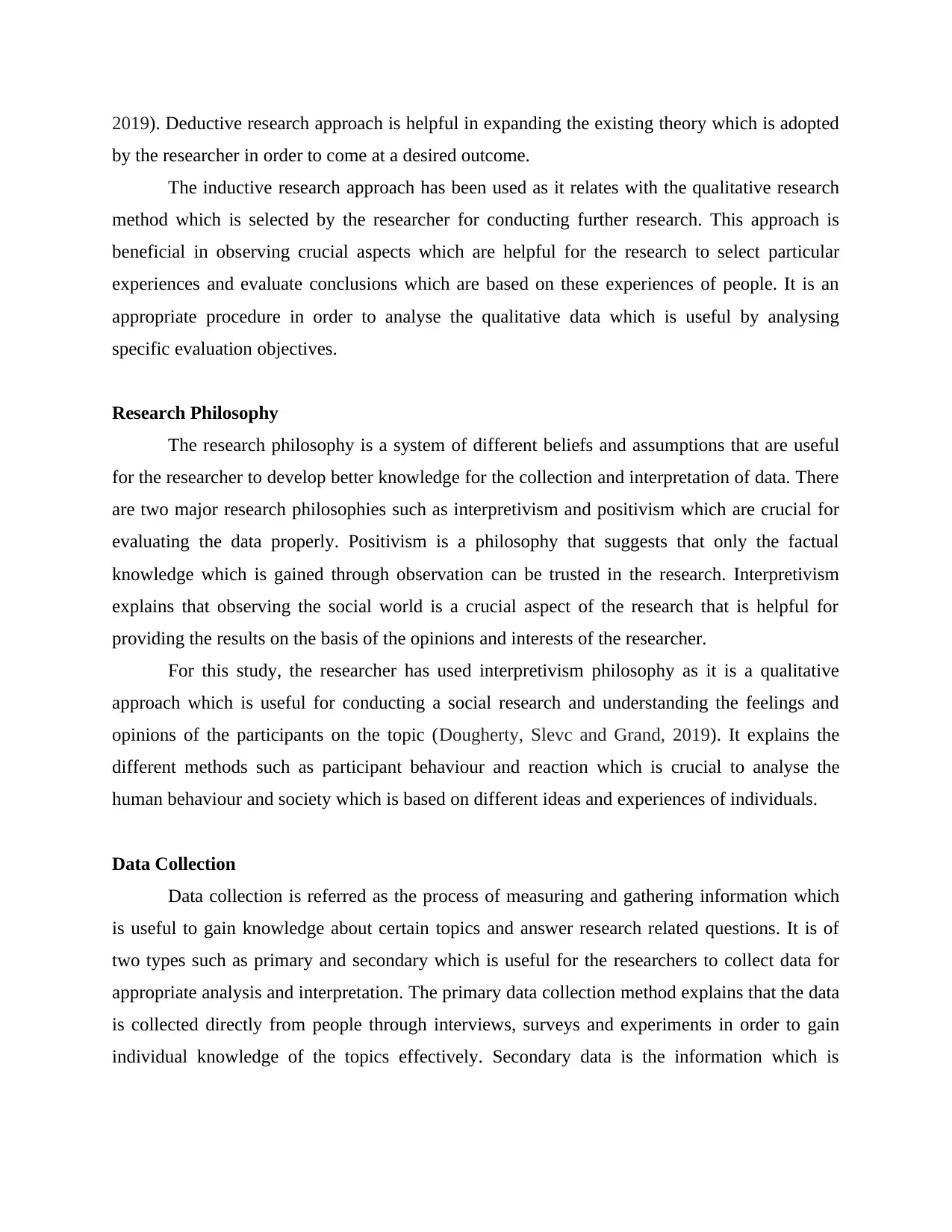
2019). Deductive research approach is helpful in expanding the existing theory which is adopted
by the researcher in order to come at a desired outcome.
The inductive research approach has been used as it relates with the qualitative research
method which is selected by the researcher for conducting further research. This approach is
beneficial in observing crucial aspects which are helpful for the research to select particular
experiences and evaluate conclusions which are based on these experiences of people. It is an
appropriate procedure in order to analyse the qualitative data which is useful by analysing
specific evaluation objectives.
Research Philosophy
The research philosophy is a system of different beliefs and assumptions that are useful
for the researcher to develop better knowledge for the collection and interpretation of data. There
are two major research philosophies such as interpretivism and positivism which are crucial for
evaluating the data properly. Positivism is a philosophy that suggests that only the factual
knowledge which is gained through observation can be trusted in the research. Interpretivism
explains that observing the social world is a crucial aspect of the research that is helpful for
providing the results on the basis of the opinions and interests of the researcher.
For this study, the researcher has used interpretivism philosophy as it is a qualitative
approach which is useful for conducting a social research and understanding the feelings and
opinions of the participants on the topic (Dougherty, Slevc and Grand, 2019). It explains the
different methods such as participant behaviour and reaction which is crucial to analyse the
human behaviour and society which is based on different ideas and experiences of individuals.
Data Collection
Data collection is referred as the process of measuring and gathering information which
is useful to gain knowledge about certain topics and answer research related questions. It is of
two types such as primary and secondary which is useful for the researchers to collect data for
appropriate analysis and interpretation. The primary data collection method explains that the data
is collected directly from people through interviews, surveys and experiments in order to gain
individual knowledge of the topics effectively. Secondary data is the information which is
by the researcher in order to come at a desired outcome.
The inductive research approach has been used as it relates with the qualitative research
method which is selected by the researcher for conducting further research. This approach is
beneficial in observing crucial aspects which are helpful for the research to select particular
experiences and evaluate conclusions which are based on these experiences of people. It is an
appropriate procedure in order to analyse the qualitative data which is useful by analysing
specific evaluation objectives.
Research Philosophy
The research philosophy is a system of different beliefs and assumptions that are useful
for the researcher to develop better knowledge for the collection and interpretation of data. There
are two major research philosophies such as interpretivism and positivism which are crucial for
evaluating the data properly. Positivism is a philosophy that suggests that only the factual
knowledge which is gained through observation can be trusted in the research. Interpretivism
explains that observing the social world is a crucial aspect of the research that is helpful for
providing the results on the basis of the opinions and interests of the researcher.
For this study, the researcher has used interpretivism philosophy as it is a qualitative
approach which is useful for conducting a social research and understanding the feelings and
opinions of the participants on the topic (Dougherty, Slevc and Grand, 2019). It explains the
different methods such as participant behaviour and reaction which is crucial to analyse the
human behaviour and society which is based on different ideas and experiences of individuals.
Data Collection
Data collection is referred as the process of measuring and gathering information which
is useful to gain knowledge about certain topics and answer research related questions. It is of
two types such as primary and secondary which is useful for the researchers to collect data for
appropriate analysis and interpretation. The primary data collection method explains that the data
is collected directly from people through interviews, surveys and experiments in order to gain
individual knowledge of the topics effectively. Secondary data is the information which is
⊘ This is a preview!⊘
Do you want full access?
Subscribe today to unlock all pages.

Trusted by 1+ million students worldwide
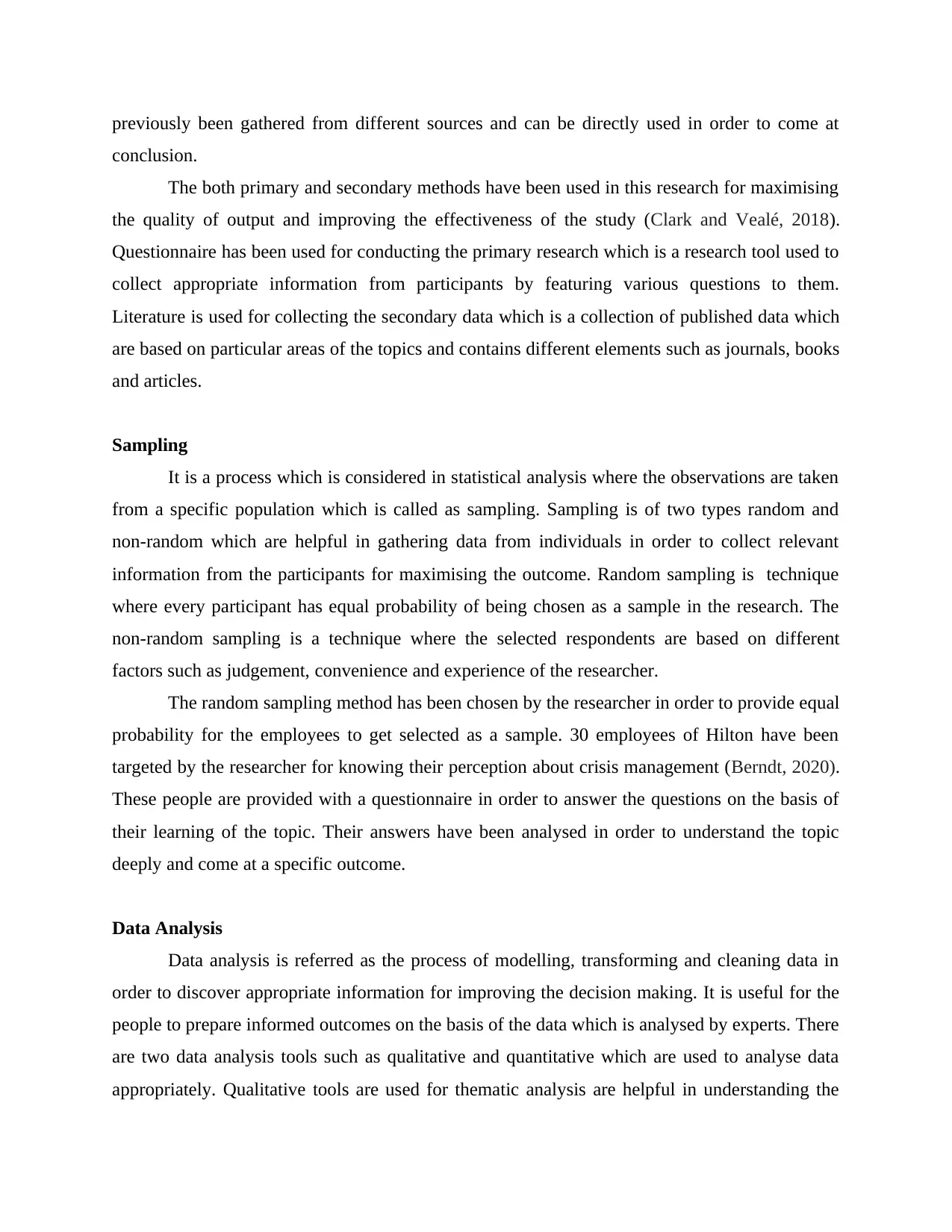
previously been gathered from different sources and can be directly used in order to come at
conclusion.
The both primary and secondary methods have been used in this research for maximising
the quality of output and improving the effectiveness of the study (Clark and Vealé, 2018).
Questionnaire has been used for conducting the primary research which is a research tool used to
collect appropriate information from participants by featuring various questions to them.
Literature is used for collecting the secondary data which is a collection of published data which
are based on particular areas of the topics and contains different elements such as journals, books
and articles.
Sampling
It is a process which is considered in statistical analysis where the observations are taken
from a specific population which is called as sampling. Sampling is of two types random and
non-random which are helpful in gathering data from individuals in order to collect relevant
information from the participants for maximising the outcome. Random sampling is technique
where every participant has equal probability of being chosen as a sample in the research. The
non-random sampling is a technique where the selected respondents are based on different
factors such as judgement, convenience and experience of the researcher.
The random sampling method has been chosen by the researcher in order to provide equal
probability for the employees to get selected as a sample. 30 employees of Hilton have been
targeted by the researcher for knowing their perception about crisis management (Berndt, 2020).
These people are provided with a questionnaire in order to answer the questions on the basis of
their learning of the topic. Their answers have been analysed in order to understand the topic
deeply and come at a specific outcome.
Data Analysis
Data analysis is referred as the process of modelling, transforming and cleaning data in
order to discover appropriate information for improving the decision making. It is useful for the
people to prepare informed outcomes on the basis of the data which is analysed by experts. There
are two data analysis tools such as qualitative and quantitative which are used to analyse data
appropriately. Qualitative tools are used for thematic analysis are helpful in understanding the
conclusion.
The both primary and secondary methods have been used in this research for maximising
the quality of output and improving the effectiveness of the study (Clark and Vealé, 2018).
Questionnaire has been used for conducting the primary research which is a research tool used to
collect appropriate information from participants by featuring various questions to them.
Literature is used for collecting the secondary data which is a collection of published data which
are based on particular areas of the topics and contains different elements such as journals, books
and articles.
Sampling
It is a process which is considered in statistical analysis where the observations are taken
from a specific population which is called as sampling. Sampling is of two types random and
non-random which are helpful in gathering data from individuals in order to collect relevant
information from the participants for maximising the outcome. Random sampling is technique
where every participant has equal probability of being chosen as a sample in the research. The
non-random sampling is a technique where the selected respondents are based on different
factors such as judgement, convenience and experience of the researcher.
The random sampling method has been chosen by the researcher in order to provide equal
probability for the employees to get selected as a sample. 30 employees of Hilton have been
targeted by the researcher for knowing their perception about crisis management (Berndt, 2020).
These people are provided with a questionnaire in order to answer the questions on the basis of
their learning of the topic. Their answers have been analysed in order to understand the topic
deeply and come at a specific outcome.
Data Analysis
Data analysis is referred as the process of modelling, transforming and cleaning data in
order to discover appropriate information for improving the decision making. It is useful for the
people to prepare informed outcomes on the basis of the data which is analysed by experts. There
are two data analysis tools such as qualitative and quantitative which are used to analyse data
appropriately. Qualitative tools are used for thematic analysis are helpful in understanding the
Paraphrase This Document
Need a fresh take? Get an instant paraphrase of this document with our AI Paraphraser
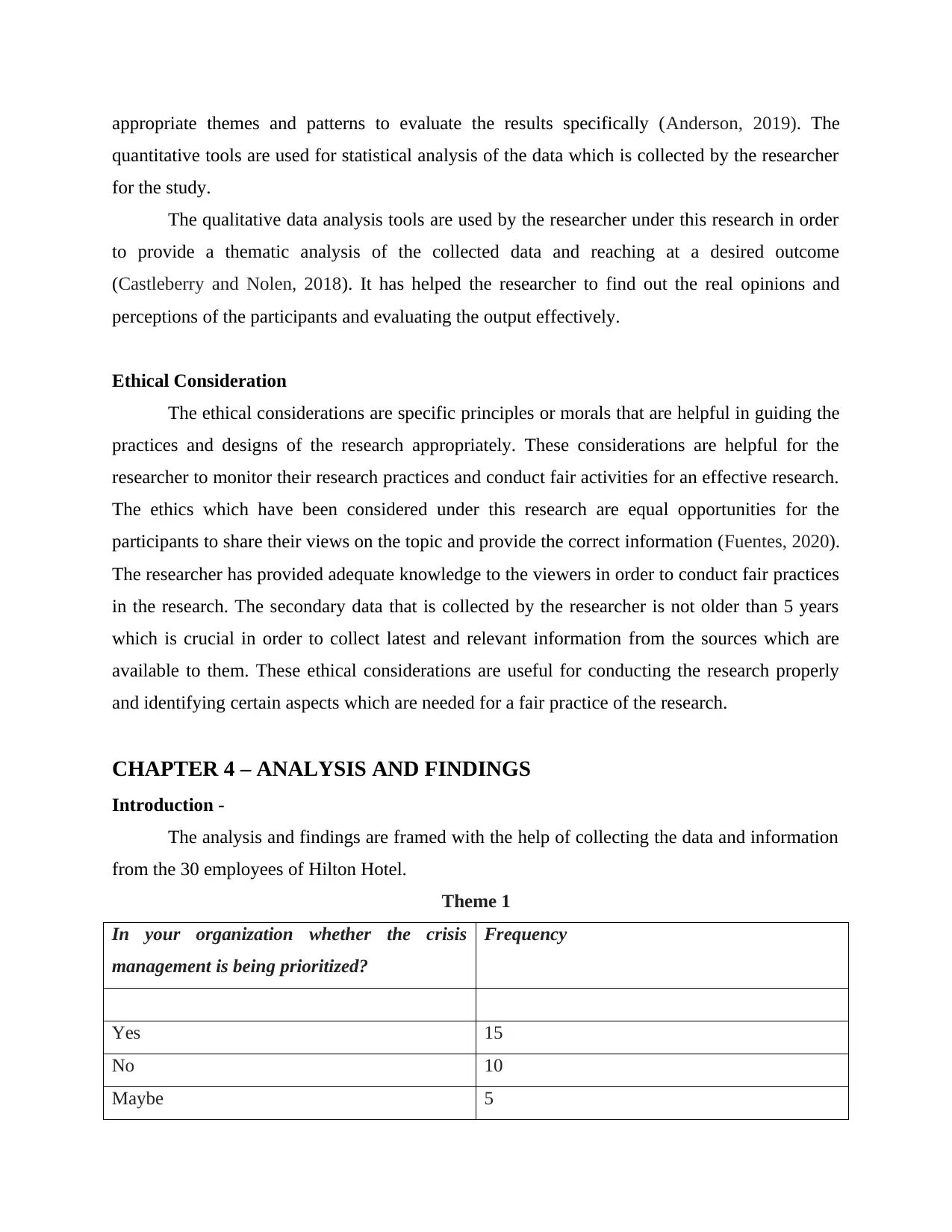
appropriate themes and patterns to evaluate the results specifically (Anderson, 2019). The
quantitative tools are used for statistical analysis of the data which is collected by the researcher
for the study.
The qualitative data analysis tools are used by the researcher under this research in order
to provide a thematic analysis of the collected data and reaching at a desired outcome
(Castleberry and Nolen, 2018). It has helped the researcher to find out the real opinions and
perceptions of the participants and evaluating the output effectively.
Ethical Consideration
The ethical considerations are specific principles or morals that are helpful in guiding the
practices and designs of the research appropriately. These considerations are helpful for the
researcher to monitor their research practices and conduct fair activities for an effective research.
The ethics which have been considered under this research are equal opportunities for the
participants to share their views on the topic and provide the correct information (Fuentes, 2020).
The researcher has provided adequate knowledge to the viewers in order to conduct fair practices
in the research. The secondary data that is collected by the researcher is not older than 5 years
which is crucial in order to collect latest and relevant information from the sources which are
available to them. These ethical considerations are useful for conducting the research properly
and identifying certain aspects which are needed for a fair practice of the research.
CHAPTER 4 – ANALYSIS AND FINDINGS
Introduction -
The analysis and findings are framed with the help of collecting the data and information
from the 30 employees of Hilton Hotel.
Theme 1
In your organization whether the crisis
management is being prioritized?
Frequency
Yes 15
No 10
Maybe 5
quantitative tools are used for statistical analysis of the data which is collected by the researcher
for the study.
The qualitative data analysis tools are used by the researcher under this research in order
to provide a thematic analysis of the collected data and reaching at a desired outcome
(Castleberry and Nolen, 2018). It has helped the researcher to find out the real opinions and
perceptions of the participants and evaluating the output effectively.
Ethical Consideration
The ethical considerations are specific principles or morals that are helpful in guiding the
practices and designs of the research appropriately. These considerations are helpful for the
researcher to monitor their research practices and conduct fair activities for an effective research.
The ethics which have been considered under this research are equal opportunities for the
participants to share their views on the topic and provide the correct information (Fuentes, 2020).
The researcher has provided adequate knowledge to the viewers in order to conduct fair practices
in the research. The secondary data that is collected by the researcher is not older than 5 years
which is crucial in order to collect latest and relevant information from the sources which are
available to them. These ethical considerations are useful for conducting the research properly
and identifying certain aspects which are needed for a fair practice of the research.
CHAPTER 4 – ANALYSIS AND FINDINGS
Introduction -
The analysis and findings are framed with the help of collecting the data and information
from the 30 employees of Hilton Hotel.
Theme 1
In your organization whether the crisis
management is being prioritized?
Frequency
Yes 15
No 10
Maybe 5
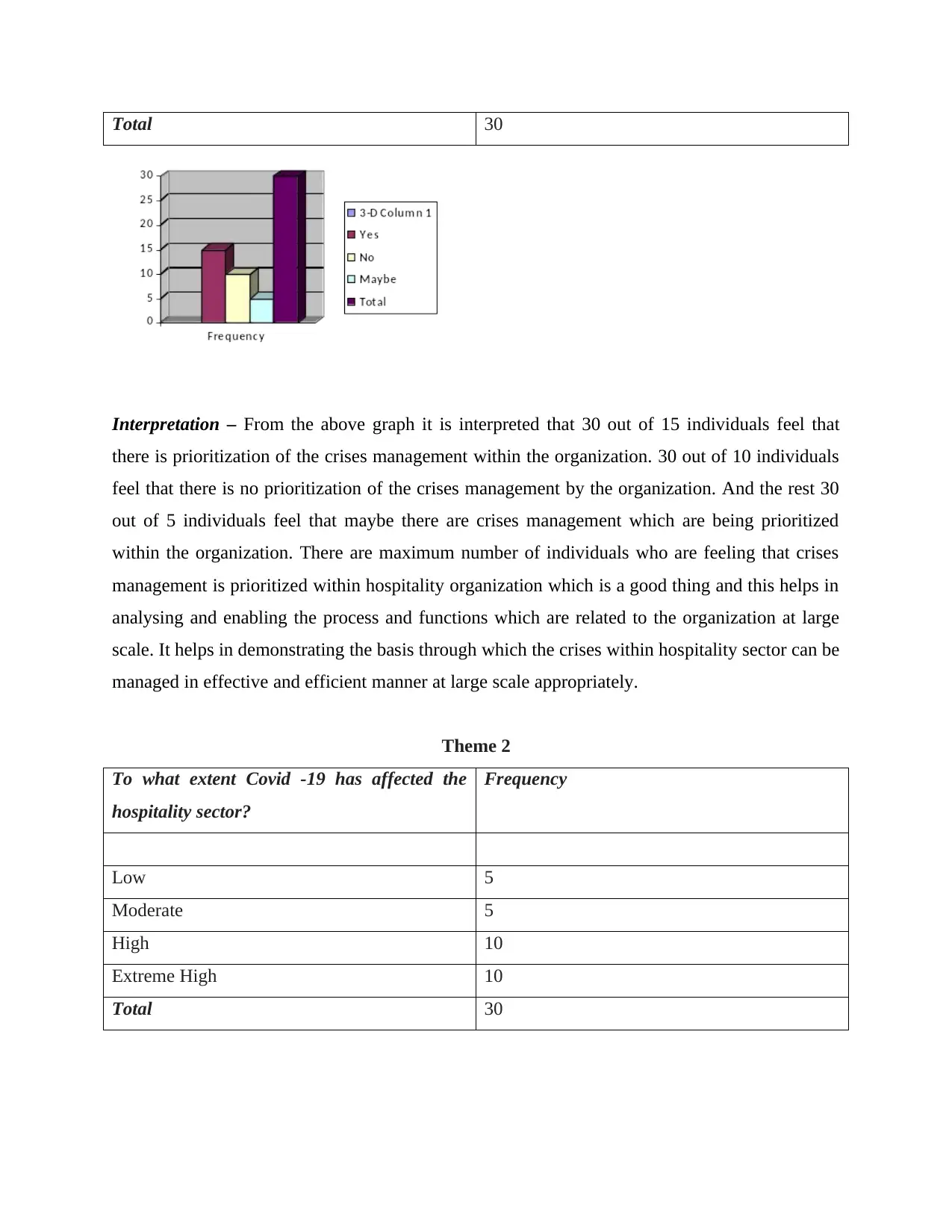
Total 30
Interpretation – From the above graph it is interpreted that 30 out of 15 individuals feel that
there is prioritization of the crises management within the organization. 30 out of 10 individuals
feel that there is no prioritization of the crises management by the organization. And the rest 30
out of 5 individuals feel that maybe there are crises management which are being prioritized
within the organization. There are maximum number of individuals who are feeling that crises
management is prioritized within hospitality organization which is a good thing and this helps in
analysing and enabling the process and functions which are related to the organization at large
scale. It helps in demonstrating the basis through which the crises within hospitality sector can be
managed in effective and efficient manner at large scale appropriately.
Theme 2
To what extent Covid -19 has affected the
hospitality sector?
Frequency
Low 5
Moderate 5
High 10
Extreme High 10
Total 30
Interpretation – From the above graph it is interpreted that 30 out of 15 individuals feel that
there is prioritization of the crises management within the organization. 30 out of 10 individuals
feel that there is no prioritization of the crises management by the organization. And the rest 30
out of 5 individuals feel that maybe there are crises management which are being prioritized
within the organization. There are maximum number of individuals who are feeling that crises
management is prioritized within hospitality organization which is a good thing and this helps in
analysing and enabling the process and functions which are related to the organization at large
scale. It helps in demonstrating the basis through which the crises within hospitality sector can be
managed in effective and efficient manner at large scale appropriately.
Theme 2
To what extent Covid -19 has affected the
hospitality sector?
Frequency
Low 5
Moderate 5
High 10
Extreme High 10
Total 30
⊘ This is a preview!⊘
Do you want full access?
Subscribe today to unlock all pages.

Trusted by 1+ million students worldwide
1 out of 22
Related Documents
Your All-in-One AI-Powered Toolkit for Academic Success.
+13062052269
info@desklib.com
Available 24*7 on WhatsApp / Email
![[object Object]](/_next/static/media/star-bottom.7253800d.svg)
Unlock your academic potential
Copyright © 2020–2026 A2Z Services. All Rights Reserved. Developed and managed by ZUCOL.




